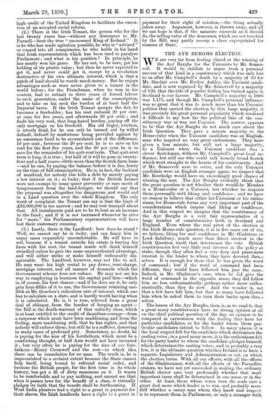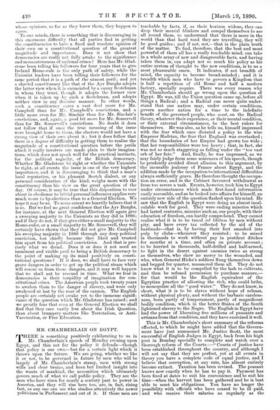THE AYR BURGHS ELECTION.
WE are very far from feeling elated at the winning of the Ayr Burghs for the Unionists by Mr. Somer- veil. It would. be childish to argue from a personal success of that kind in a constituency which was only lost to us after Mr. Campbell's death by a majority of 63 for Mr. Sinclair over Mr. Evelyn Ashley, the Unionist candi- date, and is now regained by Mr. Somervell by a majority of 130, that the tide of popular feeling has turned again in Scotland in our favour. Mr. Campbell's majority in 1886 was 1,175, and though Mr. Campbell's personal influence was so great that it was he much more than his Unionist politics that carried the election by this large majority, it was precisely his great personal popularity which rendered it difficult to say how far the political bias of the con- stituency was or was not Unionist. The answer appears to be that the Ayr Burghs do not much care about the Irish Question. They gave a minute majority to the Home-ruler when the Unionist candidate was an English- man who inspired no very great enthusiasm. They have given a less minute, but still not a large majority, to a Unionist when the Unionist candidate was a clever Scotchman, without Mr. Campbell's great local in- fluence, but still one who could talk homely broad Scotch which went straight to the hearts of his constituents. And if Mr. Somervell were to retire, and the only Unionist candidate were an English stranger again, we suspect that Mr. Routledge would have an exceedingly good chance of winning the seat. The Ayr Burghs evidently think that the great question is not whether their would-be Member is a Home-ruler or a Unionist, but whether he inspires them personally with liking and confidence ; and we have no reason to believe that either his Unionism or his enthu- siasm for Home-rule forms any very important part of the considerations which inspire that liking or confidence. And in this respect we imagine that the constituency of the Ayr Burghs is a very fair representative of a large number of constituencies both in Scotland and England. Even where the real pivot of the election is the Irish Home-rule question, it is in five cases out of six, we believe, liking 'for and confidence in Mr. Gladstone or Lord Salisbury, much more than direct interest in the Irish Question itself, that determines the vote. British constituencies feel very little real interest in the policy at stake, though they often feel a very deep and passionate interest in the leader to whom they have devoted then.- - selves. It is enough for them that he has given the word of command ; but if the word of command had been different, they would. have followed him just the same. Indeed, in Mr. Gladstone's case, when he did give the word of command in the opposite sense, they did follow him no less enthusiastically, perhaps rather more enthu- siastically, than they do now. And the wonder is, not that a few have left him, but that so many have followed him when he asked them to turn their backs upon then..- selves.
The lesson of the Ayr Burghs, then, is, as we read it, that a great many constituencies have no strong opinion at all on the chief political question of the day, no opinion to be compared in earnestness with the feeling they have for particular candidates, or for the leader whom those par- ticular candidates intend to follow. In many places, it is the local respect felt for the candidate which determines the casting votes ; in a good many more, it is the enthusiasm felt for the party leader to whom the candidate pledges himself, which determines the casting votes ; and in probably a very few, it is the ultimate question whether Ireland is to have a separate Legislature and Administration or not, on which the election turns. With all our efforts, with all the efforts of the Gladstonians, with all the efforts of the Parnellite orators, we have not yet succeeded in making the ordinary British elector care very profoundly whether that most important issue shall be determined in one sense or in the other. At least, those whose votes turn the scale care a great deal more which leader is to win, and probably more still whether a canny man whom they know and respect is to represent them in Parliament, or only a stranger with whose opinions, so far as they know them, they happen to agree. To our minds, there is something that is discouraging in this enormous difficulty that all parties find in getting the constituencies to have a fixed and resolute opinion of their own on a constitutional question of the greatest magnitude and importance. Does it not show that democracies are really not fully awake to the significance and momentousness of national crises ? Here has Mr. Glad- stone been telling his followers for four years that to give Ireland Home-rule is the only path of safety, while the Unionist leaders have been telling their followers for the same period that it is a path of the utmost peril ; and yet a shrewd constituency like that of the Ayr Burghs adopts the latter view when it is enunciated by a canny Scotchman in whom they trust, though it adopts the former view when it is taken up by such a Scotchman, and adopts neither view in any decisive manner. In other words, such a constituency cares a vast deal more for Mr. Campbell than for Mr. Campbell's convictions, and a little more even for Mr. Sinclair than for Mr. Sinclair's convictions, and, again, a good bit more for Mr. Somervell than for Mr. Somervell's convictions. No doubt it does not follow that if once the true meaning of the issue were brought home to them, the electors would not have a strong view of their own about it ; but it does follow that there is a degree of difficulty in getting them to realise the magnitude of a constitutional question before the perils which it really involves are made plain to their imagina- tions, which does not speak well for the practical instincts, for the political sagacity, of the British democracy. Whether Mr. Gladstone be right or whether the Unionists be right, at all events the issue is one of the very highest importance, and it is discouraging to think that a man's local reputation, or his pleasant Scotch dialect, or any personal consideration of the kind, weighs more with the constituency than his view on the great question of the day. Of course, it may be true that this disposition to veer about in obedience to trivial personal influences applies very much more to by-elections than to a General Election. We hope it may be so. To some extent we heartily believe that it is so. But we feel no great confidence that the Ayr Burghs, for instance, at the next General Election will again give a sweeping majority to the Unionists as they did in 1886; and if they do not, if they give either a small majority to the Home-ruler, or a small majority to Mr. Somervell, they will certainly have shown that they did not give Mr. Campbell his sweeping majority in 1886 through any deep political conviction, but chiefly because they liked and trusted him apart from his political convictions. And that is pre- cisely what we dread. Does it or does it not need an imminent and visible peril to bring a British democracy to the point of making up its mind positively on consti- -tutional questions ? If it does, we shall have to face very grave dangers in order to get up the political steam which will rescue us from those dangers, and it may well happen that we shall not be rescued in time. What we fear in democracies is their torpidity of imagination for con- stitutional crises. The American people took twenty years to awaken them to the danger of slavery, and were only awakened at last by the roar of the cannon, The English people are certainly not awake yet to the immense signifi- cance of the question which Mr. Gladstone has raised ; and we greatly fear that even at the General Election we shall find that they care vastly less about the Irish Question, than about trumpery matters like Teetotalism, or Anti- Vaccination, or Free Education.







































 Previous page
Previous page